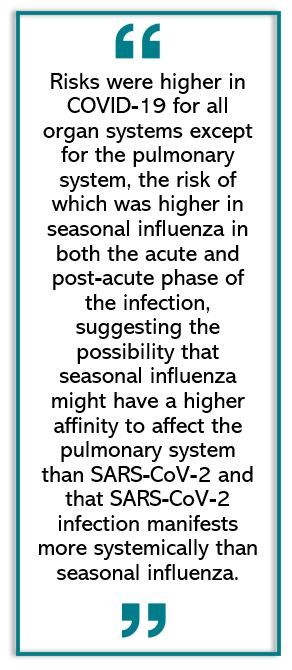- Clinical Technology
- Adult Immunization
- Hepatology
- Pediatric Immunization
- Screening
- Psychiatry
- Allergy
- Women's Health
- Cardiology
- Pediatrics
- Dermatology
- Endocrinology
- Pain Management
- Gastroenterology
- Infectious Disease
- Obesity Medicine
- Rheumatology
- Nephrology
- Neurology
- Pulmonology
Hospitalization for COVID-19 vs for Influenza Linked to More, More Severe Long-Term Outcomes: Study
Hospital admission for infection with COVID-19 compared to that for seasonal influenza was associated with significantly higher cumulative rates of mortality, long-term adverse events, and health care utilization, according to new research published by investigators at the VA St Louis Health Care System, in St Louis, MO.
©Valerii/stock.adobe.com

Ziyad Al-Aly, MD, director of the Clinical Epidemiology Center, and chief of the Research and Education Service at the VA Saint Louis Health Care System, and colleagues reported specifically that among more than 92 000 US military veterans admitted for infection with either SARS-COV-2 or influenza, the risk of mortality over an 18-month follow-up period was 51.1% greater among those with COVID-19 than with influenza. Further, when the researchers compared the incidence of a set of 94 prespecified health outcomes that could be sequelae of either COVID-19 or seasonal influenza, those with the former had an increased risk of 64 of the 94 (68.1%) while there was an increased risk of just 6 of the 94 outcomes (6.4%) among those hospitalized for influenza.
In the study’s analysis of comparative health risks by organ system, veterans hospitalized for COVID-19 had elevated risk in 9 of the 10 systems, excluding the pulmonary system, where risk was higher in the group hospitalized for influenza.
The findings were published in The Lancet Infectious Diseases.
Al-Aly and colleagues do not minimize the long-term impact of hospitalization for influenza, noting that both infections lead to acute and post-acute health and financial burdens for patients, families, and the health care system. The findings from this long-term study of outcomes corroborate data from studies of shorter duration and smaller scope, the authors wrote, and all support the need for more focused efforts to prevent hospitalization for the 2 viruses and increased resources for care of people with long-term effects from either one.
The researchers were interested in the comparative risks and burdens of COVID-19 and seasonal influenza beyond the average 6 months of data captured in existing findings. Their study is also the first to compare both the acute and long-term risks and burdens of a “comprehensive set of adverse health outcomes representing all major organ systems that could be affected following hospital admission for COVID-19 or seasonal influenza.”
Al-aly and team tapped the US Veterans Administration (VA) health care databases, collecting data from 81 280 participants with a hospital admission for COVID-19 between March 1, 2020, and June 30, 2022, and 10 985 participants admitted for seasonal influenza between Oct 1, 2015, and Feb 28, 2019. Mean age in both groups was 70 years and more than 90% of participants in both groups were men. Approximately three-quarters of each group was White. Participants were followed up for up to 18 months.
In addition to the parameters mentioned, researchers also compared rates of hospital readmission and admission to the intensive care unit (ICU) between the 2 infected groups and estimated disability-adjusted life-years (DALYs) per 100 persons. They evaluated risks at 30 days, 180 days, 360 days, and 540 days after hospital admission.
FINDINGS
The 51.1% (95% CI, 1.45-1.58) increased risk of death for post-COVID-19 participants corresponded to an excess mortality rate of 8.62 (95% CI, 7.55-9.44) per 100 persons at 540 days post-hospitalization, according to the results. The risk of death was higher in this group for all time periods.

Of the 94 prespecified health outcomes, the team reported that the increased risk of 64 of them in the COVID-19 cohort included significantly greater likelihood for cardiovascular, coagulation and hematologic, fatigue, gastrointestinal, kidney, mental health, metabolic, musculoskeletal, neurologic, and pulmonary outcomes.
Participants with seasonal influenza, they found, were at increased risk for only 6 of the 94 outcomes: angina, tachycardia, type 1 diabetes, and 3 of 4 prespecified pulmonary outcomes (cough, hypoxemia, and shortness of breath.
According to the investigators, across all organ systems for the 18-month follow-up period, COVID-19 was associated with an excess rate of adverse health outcomes of 78.7 per 100 persons compared with seasonal influenza. Findings were similar when investigators calculated disability-adjusted life years (DALYs): COVID-19 was associated with 45.03 higher DALYs per 100 persons compared with the influenza cohort. They reported that for both viruses the burden of health loss was higher during the post-acute vs acute infection phase; not surprisingly, and except for the pulmonary system, the burden of health loss was higher across all organ systems for COVID-19-affected participants. The COVID-19 cohort also had an excess rate of hospital readmission of 20.5 per 100 persons and of ICU admission (9.23).
Taken together, the authors concluded the findings suggest that "effort to reduce the risk of hospital admission for COVID-19 via prevention of infection and reinfection (especially in vulnerable populations),vaccination, and the use of antivirals should remain a core pillar of public health policy.”
